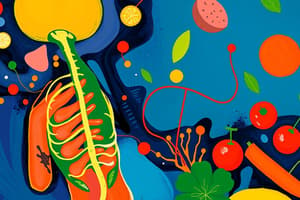Podcast
Questions and Answers
What is the science of nutrition?
What is the science of nutrition?
The study of the nutrients and other substances in foods and their actions within the body.
Which sciences is the foundation of nutrition based on?
Which sciences is the foundation of nutrition based on?
- Biology
- Biochemistry
- Physiology
- All of the above (correct)
What is a diet?
What is a diet?
The foods and beverages a person eats and drinks.
What are functional foods?
What are functional foods?
What is the role of a Registered Dietitian Nutritionist?
What is the role of a Registered Dietitian Nutritionist?
The six classes of nutrients are: water, carbohydrates, lipids, proteins, vitamins, and __________.
The six classes of nutrients are: water, carbohydrates, lipids, proteins, vitamins, and __________.
What do nutrients provide to the body?
What do nutrients provide to the body?
Which of the following is an essential nutrient?
Which of the following is an essential nutrient?
Match the following energy-yielding nutrients with their corresponding components.
Match the following energy-yielding nutrients with their corresponding components.
What is energy density?
What is energy density?
Which type of food is considered nutrient-dense?
Which type of food is considered nutrient-dense?
Empty calories provide a high amount of nutrients.
Empty calories provide a high amount of nutrients.
What are Dietary Reference Intakes?
What are Dietary Reference Intakes?
Flashcards are hidden until you start studying
Study Notes
Science of Nutrition
- Examines nutrients and their actions in the body including ingestion, digestion, absorption, metabolism, and excretion.
- Focuses on interactions and balance of nutrients, influencing health, growth, reproduction, and disease prevention.
- Integrates disciplines such as biology, biochemistry, and physiology.
- Nutritional genomics studies how nutrients influence gene activities and vice versa.
Nutrition in Daily Life
- Foods consist of nutrients and non-nutrients, providing energy and substances for tissue maintenance.
- Diet is the collection of foods and beverages consumed, not limited to weight loss plans.
- Functional foods are whole or modified foods with health benefits beyond basic nutrition, such as disease risk reduction.
Professionals in Nutrition
- Registered Dietitian Nutritionists (RDNs) are food and nutrition experts offering personalized advice, chronic disease management, and guidance on allergens and intolerances.
Impact of Food Choices
- Daily food choices can benefit or harm health, influencing chronic diseases.
- Factors affecting food selection include preferences (taste, genetics), habits (tradition, availability), and emotional responses.
Composition of Food
- Six classes of nutrients: water, carbohydrates (including fiber), lipids, proteins, vitamins, and minerals.
- Includes non-nutrients like phytochemicals and food additives which can have various effects (beneficial, neutral, harmful).
Nutrient Specifications
- Essential nutrients must be obtained from food; about 40 are essential for humans.
- Organic nutrients contain carbon, e.g., carbohydrates, proteins, and vitamins; inorganic nutrients include minerals and water.
Energy-Yielding Nutrients
- Energy-yielding nutrients include carbohydrates, proteins, and lipids, while vitamins, minerals, and water do not provide energy.
- Energy from food measured in kilocalories, essential for bodily functions and activities.
Calculating Food Energy
- To calculate the energy from food, consider quantities of carbohydrates, proteins, and fats, multiplying by their respective energy values.
- Example: A slice of bread with peanut butter totals 173 kcal from 16g carbs, 7g protein, and 9g fat.
Energy and Nutrient Density
- Energy density refers to kcal per gram of food; lower-density foods have more volume with fewer calories, while higher-density foods provide more calories in less weight.
- Nutrient-dense foods offer higher nutrients with fewer calories, such as fruits, vegetables, and whole grains.
Nutritional Profiling
- Nutritional profiling ranks foods based on nutrient content, considering both beneficial (e.g., protein, fiber) and harmful (e.g., saturated fats, sugars) components.
- This methodology helps in evaluating food choices for maintaining a balanced diet.
Nutritional Requirements
- Nutritional requirements denote the necessary intake levels of different nutrients, varying by individual circumstances (e.g., life stages, gender).
- Requirements are classified to ensure adequate intake to support bodily functions and reduce disease risks, including:
- Proteins in grams
- Vitamins in milligrams (mg) or micrograms (µg)
Dietary Reference Intakes (DRIs)
- Comprise reference values for nutrients, including Estimated Average Requirements (EAR), Recommended Dietary Allowances (RDA), Adequate Intakes (AI), and Tolerable Upper Limits (UL).
Studying That Suits You
Use AI to generate personalized quizzes and flashcards to suit your learning preferences.





